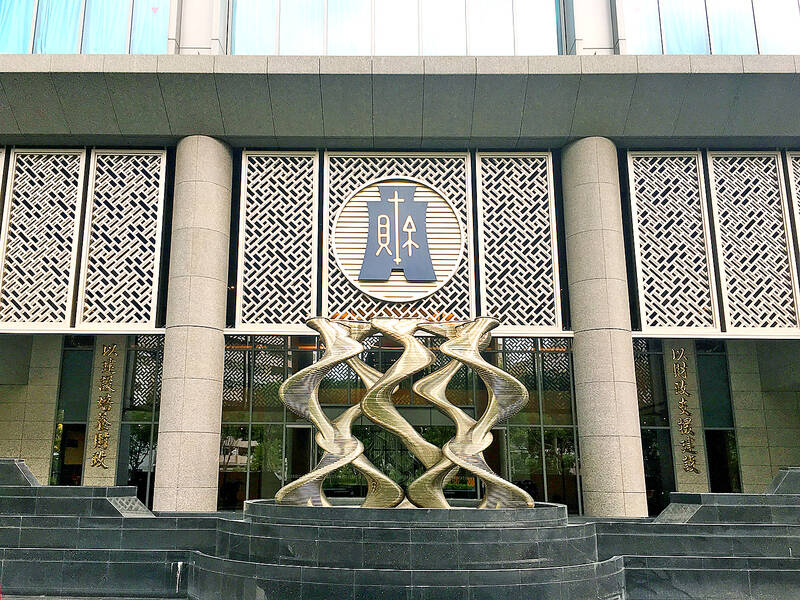The government last month collected NT$349.8 billion (US$10.79 billion) of tax revenue, soaring 50.9 percent from a year earlier, helped by solid gains in corporate and personal income as well as securities transactions taxes, the Ministry of Finance said yesterday.
Revenue from corporate income tax surged 73.2 percent year-on-year to NT$241.2 billion, as major local technology companies posted big increases in shipments of electronics used in artificial intelligence, ministry statistics official Liang Kuan-hsuan (梁冠璇) told a news conference in Taipei.
The significant rise in corporate income tax revenue was also due to a low comparison base from a year earlier, when temporary tax payment measures were suspended, Liang said.

Photo: Clare Cheng, Taipei Times
Revenue from personal income tax rose 15.8 percent to NT$46.7 billion, as people received higher cash dividends from their investments in listed firms and from transfers of real-estate properties, she said.
The central bank’s credit controls in September prompted some investors to exit the housing market to avoid potential price corrections, she said.
As a result, revenue from the land value increase tax was NT$7 billion, a 22.1 percent increase from a year earlier, the ministry’s report said.
The tax is paid when people resell houses.
Revenue from securities transactions rose 38.3 percent year-on-year to NT$431.1 billion as investors benefited from Taiwan Semiconductor Manufacturing Co’s (台積電) strong third-quarter earnings and positive outlook ahead of last week’s US presidential election, Liang said.
In the first 10 months, cumulative tax revenues rose 9 percent year-on-year to NT$3.3 trillion and already met the target set for the whole of this year, she said.
Overall excess tax revenue could reach NT$400 billion at the end of this year, she added.
Policymakers tend to be conservative when preparing the revenue budget to avoid a shortfall.

Vincent Wei led fellow Singaporean farmers around an empty Malaysian plot, laying out plans for a greenhouse and rows of leafy vegetables. What he pitched was not just space for crops, but a lifeline for growers struggling to make ends meet in a city-state with high prices and little vacant land. The future agriculture hub is part of a joint special economic zone launched last year by the two neighbors, expected to cost US$123 million and produce 10,000 tonnes of fresh produce annually. It is attracting Singaporean farmers with promises of cheaper land, labor and energy just over the border.

US actor Matthew McConaughey has filed recordings of his image and voice with US patent authorities to protect them from unauthorized usage by artificial intelligence (AI) platforms, a representative said earlier this week. Several video clips and audio recordings were registered by the commercial arm of the Just Keep Livin’ Foundation, a non-profit created by the Oscar-winning actor and his wife, Camila, according to the US Patent and Trademark Office database. Many artists are increasingly concerned about the uncontrolled use of their image via generative AI since the rollout of ChatGPT and other AI-powered tools. Several US states have adopted

A proposed billionaires’ tax in California has ignited a political uproar in Silicon Valley, with tech titans threatening to leave the state while California Governor Gavin Newsom of the Democratic Party maneuvers to defeat a levy that he fears would lead to an exodus of wealth. A technology mecca, California has more billionaires than any other US state — a few hundred, by some estimates. About half its personal income tax revenue, a financial backbone in the nearly US$350 billion budget, comes from the top 1 percent of earners. A large healthcare union is attempting to place a proposal before

KEEPING UP: The acquisition of a cleanroom in Taiwan would enable Micron to increase production in a market where demand continues to outpace supply, a Micron official said Micron Technology Inc has signed a letter of intent to buy a fabrication site in Taiwan from Powerchip Semiconductor Manufacturing Corp (力積電) for US$1.8 billion to expand its production of memory chips. Micron would take control of the P5 site in Miaoli County’s Tongluo Township (銅鑼) and plans to ramp up DRAM production in phases after the transaction closes in the second quarter, the company said in a statement on Saturday. The acquisition includes an existing 12 inch fab cleanroom of 27,871m2 and would further position Micron to address growing global demand for memory solutions, the company said. Micron expects the transaction to